The American Film Institute Fest has begun at the Chinese theaters in Hollywood. The longest-running international Los Angeles film festival has brought cinema from around the world to the hub of Hollywood for over four decades since its origins as FILMEX in 1971. The festival is a renowned center for the American debut and screenings of international films, domestic features and world short films for Academy Award consideration, as well as directorial panels, tributes and red carpet gala premieres.
Sebastian Torrelio and Tony Huang will be attending for the following week, screening several of the biggest films being put up for audience award consideration and otherwise. On their first day of AFI Fest, both saw a mix of films that included directors both local and overseas, including Georgian, Korean and Japanese residents.
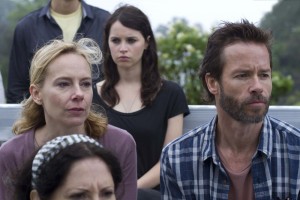 [media-credit name=”Cohen Media Group” align=”center” width=”200″]
[media-credit name=”Cohen Media Group” align=”center” width=”200″]
“Breathe In”
Directed by Drake Doremus
Cohen Media Group
“Breathe In” compares heavily to director Drake Doremus’s last cinematic effort, the 2011 indie hit “Like Crazy.” It’s a slow, romantically induced movie with likeable characters who manage to find themselves in a situation far out of their control due to their shortcomings. Doremus has a knack for creating subtly dark settings for his characters, an unconventionally relaxed scene throughout for his chaos to unfold in.
Keith Reynolds (Guy Pearce) is a music teacher aspiring to play orchestral cello, casually pursuing his dream with the support of his wife (Amy Ryan) and daughter (Mackenzie Davis). The family takes in an English exchange student for the semester, Sophie (Felicity Jones), who proves a talented, though reserved guest. The film plays out with subtle tension between Sophie, Keith and Keith’s daughter, developing without much portrayed conflict until the film’s end, a shockingly hectic 20 minutes of life-ruining events.
Pearce and Jones play their roles to a tee, designed near perfectly for them. The script, unfortunately, is a bit less perfect, presenting a psychological tale of relationships without much development – or at least with development a bit too slow to be identifiable. Doremus leads with a confident hand, playing out his attention grabbing moments with shots of back-and-forth tension, but without much of a bang to really set things off. He has an interesting premise and interesting people to play it out, but somehow can’t really find a way to blend it all together.
–Sebastian Torrelio
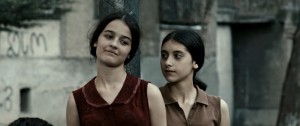 [media-credit name=”Big World Pictures” align=”center” width=”300″]
[media-credit name=”Big World Pictures” align=”center” width=”300″]
“In Bloom”
Directed by Nana Ekvtimishvili and Simon Groß
Big World Pictures
As Georgia’s submission to the Academy Awards for this year’s Best Foreign Language Film category, “In Bloom” is as wondrous as one would expect – a tale of survival and dissension in an underdeveloped nation. Directors Nana Ekvtimishvili and Simon Groß, who were in attendance at AFI Fest for a post-film Q&A, guide their young leads to extreme lengths, evoking a turbulent storyline out of two young girls while effectively removing (and practically destroying) the childhood innocence that audience members come in expecting.
Lika Babluani and Mariam Bokeria masterfully play Eka Khizanishvili and Natia Zaridze, respectively, two teenage best friends who start off doing the usual school and family thing in their hometown of Georgian capital Tblisi in the early 1990s. Society has an order to it, especially for growing women, at the time, but both have the intent interest to ignore what aspirations others have for them. Natia remains the focus of the plot, with her relationship problems turning slowly but surely hostile, building the tension between her and her “loved ones” to boiling points.
Directing children is no easy task, but Ekvtimishvili and Groß do it with such a sleek sleight of hand that one would assume they’ve been doing it their whole lives. Emotional stakes run high in “In Bloom,” presenting a dark story of adolescence while never ignoring the historical messages given by the country’s newly independent state. An admirable selection for this year’s Academy Award, “In Bloom” lives to its expected height, blossoming two young stars as dramatic craftsmen, familiarizing the audience with a lesson in morality, bathed in a wondrous spotlight.
–Sebastian Torrelio
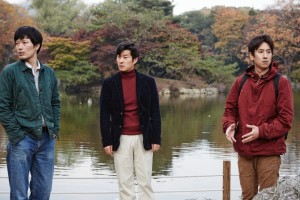 [media-credit name=”American Film Institute” align=”left” width=”300″]
[media-credit name=”American Film Institute” align=”left” width=”300″]
“Our Sunhi”
Directed by Hong Sang-Soo
Finecut
South Korean director Hong Sang-Soo returns with his third film of the year, “Our Sunhi,” a charming comedy about the struggles of a young woman trying to find herself. Seemingly of a piece with his previous film “Nobody’s Daughter Haewon,” “Sunhi” is the flipside of the former’s examination of an independent protagonist.
In contrast, as the title implies, Sunhi (played with marvelous grace by Hong veteran Jeong Yu-Mi) is somewhat a creation of the people around her. The film focuses on her and the three men she’s entangled with, including her professor, her colleague and an ex-boyfriend. Naturally, the film’s theme is self-knowledge: Who is Sunhi? Is she who they say she is?
Hong’s style here is idiosyncratically simple: flat, matter-of-fact stagings, many long conversations in single-take and zooms when he needs to punctuate. He also tends to do away with narrative, holding off on any sign of payoff only to surprise you with how much he’s built into the structure of the film.
Yet this blatant disregard for conventional filmmaking pays massive dividends: His actors are among the most natural in all of contemporary filmmaking, and he gets to switch from comedy to philosophy almost seamlessly, creating an effortless yet complex tone throughout the film. “Sunhi” in particular might be among his most accessible features, incredibly funny yet wistful and provocative, full of insight but coy with answers.
–Tony Huang
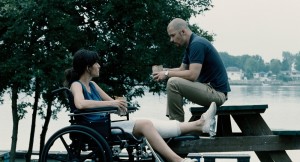 [media-credit name=”Kimstim Films” align=”left” width=”300″]
[media-credit name=”Kimstim Films” align=”left” width=”300″]
“Vic + Flo Saw a Bear”
Directed by Denis Côté
Kimstim Films
French-Canadian director Denis Côté’s “Vic + Flo Saw a Bear” is a sort of psychological thriller that derives most of its thrill from how little information it’s willing to provide the audience. Its starting point features a pair of lesbian lovers living in a cabin in the woods, both for one reason or another not totally functional in actual society. Morbidly funny at first, and then just plain morbid as it neatly unfolds, “Vic + Flo Saw a Bear” goes from quirky and amusing to quirky and annoying, and by its faux-surreal end it’s hard to tell if it ever meant to be much more than just plain quirky.
The precociousness of the film is right there at the beginning, when Vic is introduced to us giving disparaging advice to an awful young trumpeter. The title sequence busts out with rhythmic gusto and the credits really pop, and then laughs, until we’re introduced to Vic’s dying uncle. Then we settle in to some decidedly under-cooked expositional scenes introducing not a single character that moves beyond his or her plot function.
The scenes all feel a bit predetermined, floating in some abstract fictional world but without a useful perspective to make them palatable. The big virtue of the film is that it at least keeps a rousing rhythm, though it’s unfortunately put to use for rather ugly and perplexing ends – not quite “edgy,” not quite pleasurable, a beating heart covered in grime.
–Tony Huang
 [media-credit name=”The Cinema Guild” align=”left” width=”300″]
[media-credit name=”The Cinema Guild” align=”left” width=”300″]
“When Evening Falls on Bucharest or Metabolism”
Directed by Corneliu Porumboiu
Cinema Guild
The long title looks pretentious, but that’s exactly how Romanian director Corneliu Porumboiu wants it to look: the title of “When Evening Falls on Bucharest or Metabolism” is just another meta-joke in this very meta, very jokey film about a director whose affair with his actress gets in the way of his directing.
Shot in long takes, mostly two-shots of the director (Bogdan Dumitrache) and his actress (Diana Avramut) as they talk shop or argue, the film bears a slight resemblance to the films of Hong Sang-Soo, with a similar bent toward comedy, though “Bucharest” is less playful and more languorous than one would like it to be.
Indeed, although the film is eager to showcase its self-awareness (the penultimate scene is a near-literal gaze into the director’s navel), owning up to one’s pretenses doesn’t necessarily make them palatable. For instance, there’s a slight but amusing scene where the director claims that he wants to film the actress drying her hair for 10 minutes.
But although Porumboiu makes humor out of the concept of obsessive long takes solely for the purpose of “realism,” that sort of hair-drying dead air shows up quite a bit in the actual film. Meta-ness is not enough to hide a lack of inspiration, and “Bucharest” feels very much like a writer’s block film: clever but not really engaged. Here’s hoping Porumboiu got over the hump.
–Tony Huang
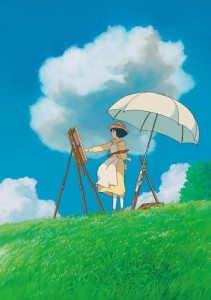 [media-credit name=”Touchstone Pictures” align=”left” width=”211″]
[media-credit name=”Touchstone Pictures” align=”left” width=”211″]
“The Wind Rises”
Directed by Hayao Miyazaki
Touchstone Pictures
If “The Wind Rises” is indeed director Hayao Miyazaki’s last film, as he so claims, then it is a terrible shame. The animation master offers an eclectic look at the turmoil of his home country of Japan during the Great Depression, throwing themes of fascism, war, natural disaster and disease in quick succession without losing much of the emotion and charm his films are traditionally known for.
Jiro Horikoshi (Hideaki Anno) is a young man lucky enough to seek out his dream of being an aircraft engineer. Since being a boy, he has always been obsessed with the man-made creatures of the sky, dreaming of designing a plane that can help Japan in whatever needs it has, whether that be for passenger transport or, unfortunately, the impending second World War. An earthquake (which historically leveled Tokyo in 1923), an outbreak of tuberculosis and a troubled economy are a few of the conflicts that Jiro confronts on his adamant journey.
Miyazaki, taking to the skies in more of a historical piece as opposed to to his magical fairy tales of past, has clearly developed the art of thematic filmmaking to a genius level comparable to his main character. The animation is near flawless, the characters as lovable and connected to the audience as any he’s ever made and the story as epic as one could hope for. It’s not perfect, succumbing to the overabundance of conflict that naturally comes with this sort of thing, but it may as well be.
–Sebastian Torrelio
